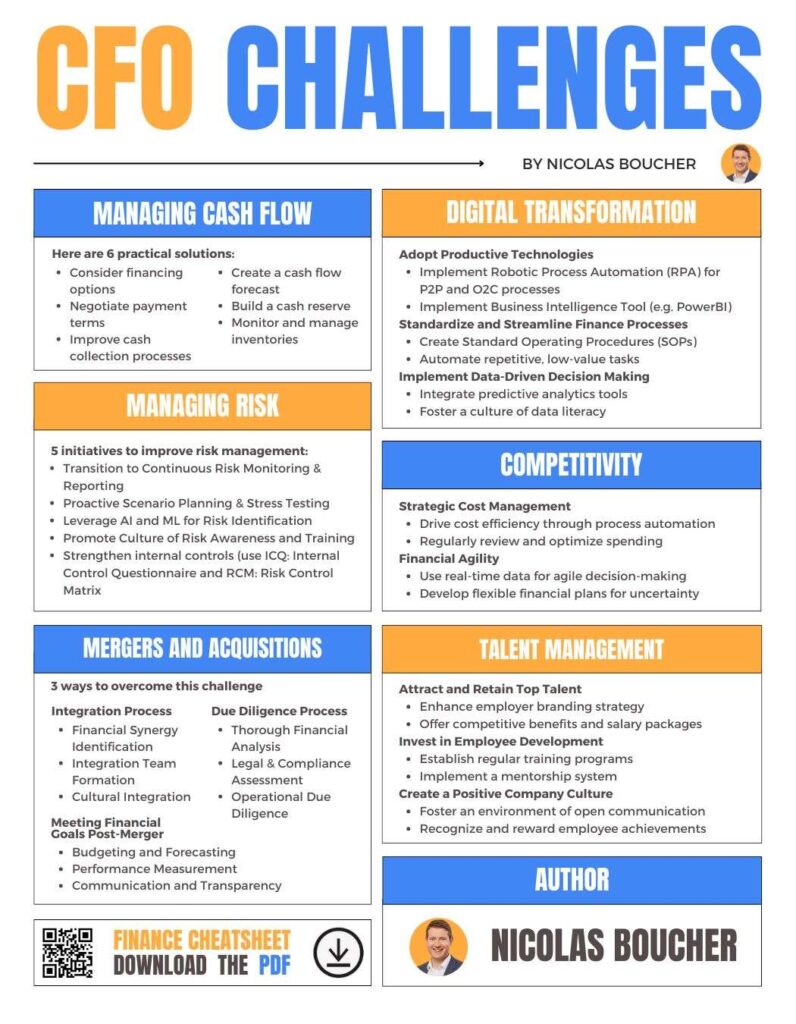As the financial stewards of organizations, Chief Financial Officers (CFOs) navigate a myriad of challenges in their pursuit of driving financial success.
Behind the scenes, CFOs face a complex web of responsibilities, from cash flow management to risk mitigation, and from digital transformation to talent management.
Therefore, in this blog post, we will explore the key challenges that CFOs encounter and provide insights into how they can address these challenges effectively.
Table of Contents
Main CFO Challenges
Here are the challenges that CFO face.

#1: Cash Flow
To ensure smooth financial operations, CFOs must consider various financing options and create accurate cash flow forecasts.
Additionally, negotiating favorable payment terms and building a cash reserve can help CFOs maintain a healthy liquidity position.
Moreover, monitoring and managing collection processes, along with improving inventory management, contribute to efficient cash flow management.
#2: Risk Management
CFOs need to transition to continuous risk monitoring and reporting, enabling them to proactively identify and address potential risks.
Implementing scenario planning and stress testing helps CFOs anticipate and prepare for various risk scenarios.
Furthermore, leveraging artificial intelligence (AI) and machine learning (ML) technologies can enhance risk identification capabilities.
Additionally, promoting a culture of risk awareness and providing training programs help create a risk-conscious organization.
Strengthening internal controls using tools like the Internal Control Questionnaire (ICQ) and Risk Control Matrix (RCM) ensures robust risk management practices.
#3: Mergers and Acquisitions (M&A)
FOs play a crucial role in the M&A process, starting with due diligence to assess the financial and legal aspects of potential transactions.
Effective management of the integration process and identification of financial synergies are key priorities for CFOs during M&A.
Also, meeting financial goals post-merger requires diligent budgeting and forecasting, performance measurement, and transparent communication.
#4: Digital Transformation
CFOs must embrace digital transformation by adopting productive technologies such as robotic process automation (RPA) and business intelligence tools.
Standardizing and streamlining finance processes through the creation of standard operating procedures (SOPs) and automation enhances efficiency.
Moreover, implementing data-driven decision-making through predictive analytics tools and fostering a culture of data literacy enables CFOs to leverage insights for strategic decision-making.
#5: Competitiveness
CFOs are responsible for strategic cost management, which involves driving cost efficiency through process automation and regular spending reviews.
Moreover, embracing financial agility by using real-time data for decision-making and developing flexible financial plans helps organizations adapt to uncertainty.
#6: Talent Management
Attracting and retaining top finance talent is a priority for CFOs.
Enhancing employer branding, offering competitive benefits, and salary packages contribute to talent acquisition.
In addition, investing in employee development through regular training programs and implementing a mentorship system nurtures the growth of finance professionals.
Also, creating a positive company culture with open communication and recognizing employee achievements fosters a motivated and engaged finance team.
The Final Verdict
The role of a CFO encompasses multifaceted challenges that require strategic thinking, adaptability, and a comprehensive understanding of finance and business operations.
Furthermore, by addressing cash flow management, risk mitigation, M&A strategies, digital transformation, competitiveness, and talent management, CFOs can position their organizations for sustainable growth and financial success.
Finally, enhance your finance and productivity skills with ChatGPT. Claim the comprehensive guide now and start your professional growth. Moreover, claim your seat in the live classes of Advanced ChatGPT for Finance and get the best live coaching on ChatGPT for CFOs and finance teams.
Key Takeaways
- Cash flow management is essential for financial stability.
- Proactive risk management mitigates potential threats.
- M&A success relies on due diligence and effective integration.
- Digital transformation enhances efficiency and decision-making.
- Strategic cost management drives competitiveness.
- Talent management is crucial for a skilled and engaged finance team.
1. What are the primary responsibilities of a CFO?
- Chief Financial Officers (CFOs) are tasked with a range of responsibilities, including cash flow management, risk mitigation, overseeing mergers and acquisitions (M&A), driving digital transformation, ensuring competitiveness, and managing talent within the finance department.
2. How do CFOs manage cash flow effectively?
- CFOs play a crucial role in maintaining smooth financial operations through accurate cash flow forecasts, negotiating favorable payment terms, and building cash reserves. They also focus on improving inventory management and optimizing collection processes to ensure efficient cash flow.
3. What strategies do CFOs use to handle risk management challenges?
- CFOs address risk management by adopting continuous monitoring and reporting practices. They implement scenario planning and stress testing to anticipate potential risks. Utilizing artificial intelligence (AI) and machine learning (ML) technologies enhances risk identification capabilities. Promoting a culture of risk awareness and implementing robust internal controls further strengthen risk management efforts.
4. How do CFOs navigate the complexities of Mergers and Acquisitions (M&A)?
- CFOs play a critical role in M&A by conducting due diligence, assessing the financial and legal aspects of transactions, and managing integration processes. They identify financial synergies and ensure transparent communication. Effective budgeting, forecasting, and performance measurement are key to meeting financial goals post-merger.
5. How do CFOs drive digital transformation within their organizations?
- CFOs embrace digital transformation by adopting technologies like robotic process automation (RPA) and business intelligence tools. They streamline finance processes with standard operating procedures (SOPs) and automation. Data-driven decision-making using predictive analytics and fostering data literacy empowers CFOs to make informed strategic decisions.
6. How do CFOs address talent management challenges in their teams?
- CFOs prioritize talent management by enhancing employer branding and offering competitive benefits. Employee development through training programs and mentorship systems nurtures finance professionals’ growth. Creating a positive company culture, open communication, and recognizing achievements motivate and engage the finance team.















